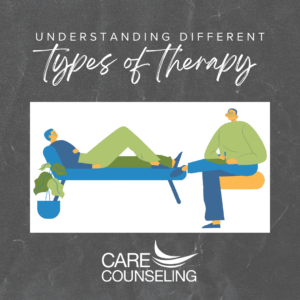Understanding Different Types of Therapy

Seeking therapy is a vital step toward improving mental health and well-being. However, with various therapy options available, it can be overwhelming to choose the right approach. In this comprehensive guide, we will explore different types of therapy, shedding light on their methodologies, benefits, and suitable conditions. Understanding these therapeutic approaches will empower individuals to make informed decisions when seeking professional mental health treatment.
- Cognitive-Behavioral Therapy (CBT)
Cognitive-Behavioral Therapy (CBT) is a widely practiced therapeutic approach aimed at identifying and changing negative thought patterns and behaviors. It helps individuals develop healthier coping mechanisms, making it effective for anxiety, depression, phobias, and various mood disorders.
- Psychoanalytic Therapy
Psychoanalytic therapy delves into the unconscious mind to explore unresolved conflicts and emotional issues from the past. By understanding these underlying factors, individuals gain insight into their present behavior, fostering personal growth and healing.
- Dialectical Behavior Therapy (DBT)
Dialectical Behavior Therapy (DBT) is a specialized form of CBT that focuses on regulating emotions, managing distress, and improving interpersonal relationships. It is particularly beneficial for individuals struggling with borderline personality disorder and self-destructive behaviors.
- Mindfulness-Based Therapy
Mindfulness-based therapies, such as Mindfulness-Based Cognitive Therapy (MBCT) and Mindfulness-Based Stress Reduction (MBSR), teach individuals to cultivate present-moment awareness and non-judgmental acceptance. These approaches are effective for managing stress, anxiety, and depression.
- Family Therapy
Family therapy involves working with family members together to address relational issues and communication patterns. It aims to improve family dynamics and resolve conflicts, making it helpful for family-related challenges, such as marital issues or parenting difficulties.
- Interpersonal Therapy (IPT)
Interpersonal Therapy (IPT) focuses on resolving interpersonal conflicts and enhancing communication skills. It targets relationship issues and is often used to treat depression and eating disorders.
- Art Therapy
Art therapy utilizes creative expression, such as painting, drawing, or sculpting, to promote emotional healing and self-discovery. It can be particularly beneficial for individuals who find it challenging to express themselves verbally.
- Gestalt Therapy
Gestalt therapy emphasizes the present moment and the importance of personal responsibility. It aims to increase self-awareness and help individuals integrate different aspects of themselves into a cohesive whole.
- Narrative Therapy
Narrative therapy focuses on identifying and reshaping the stories individuals tell themselves about their lives. By altering negative narratives, individuals can gain a sense of agency and empowerment.
- Group Therapy
Group therapy involves multiple individuals with similar challenges coming together to support each other under the guidance of a trained therapist. It provides a sense of community and fosters interpersonal growth.
Understanding the different types of therapy is essential for individuals seeking mental health treatment. Each approach offers unique methodologies and benefits, catering to various mental health concerns. Cognitive-Behavioral Therapy (CBT) is effective for changing thought patterns and behaviors, while psychoanalytic therapy delves into unconscious conflicts. Mindfulness-based therapies promote present-moment awareness, and dialectical behavior therapy (DBT) aids in emotion regulation. Family therapy improves family dynamics, and art therapy facilitates emotional healing through creative expression.
The right therapeutic approach depends on individual needs and preferences. Whether seeking individual, family, or group therapy, taking the step towards professional mental health treatment can lead to transformative growth and healing. Remember that therapy is a collaborative process, and finding a skilled and empathetic therapist is vital for a successful therapeutic journey. By becoming informed about the different types of therapy available, individuals can embark on a path towards improved mental well-being and a brighter future.



























